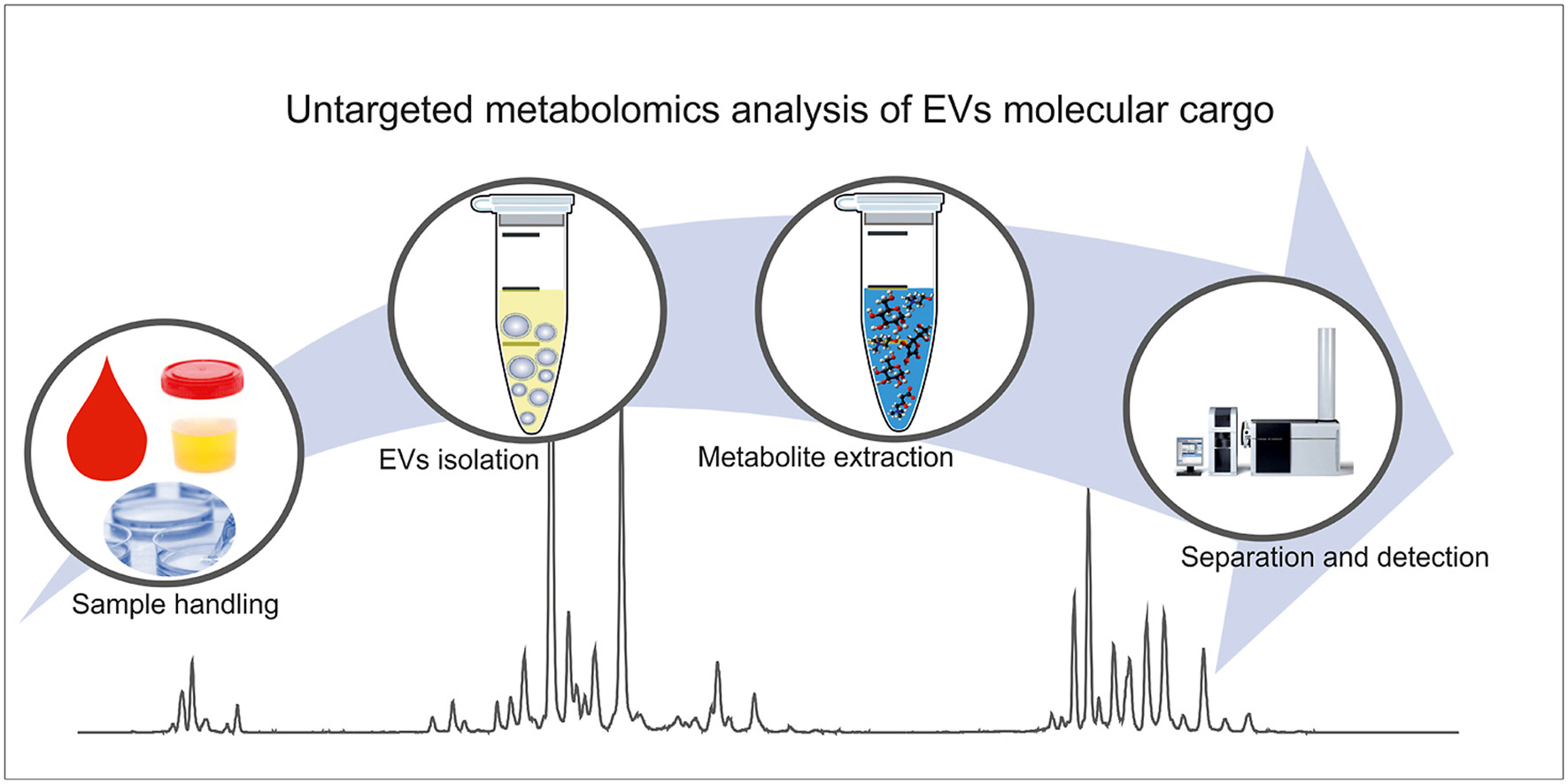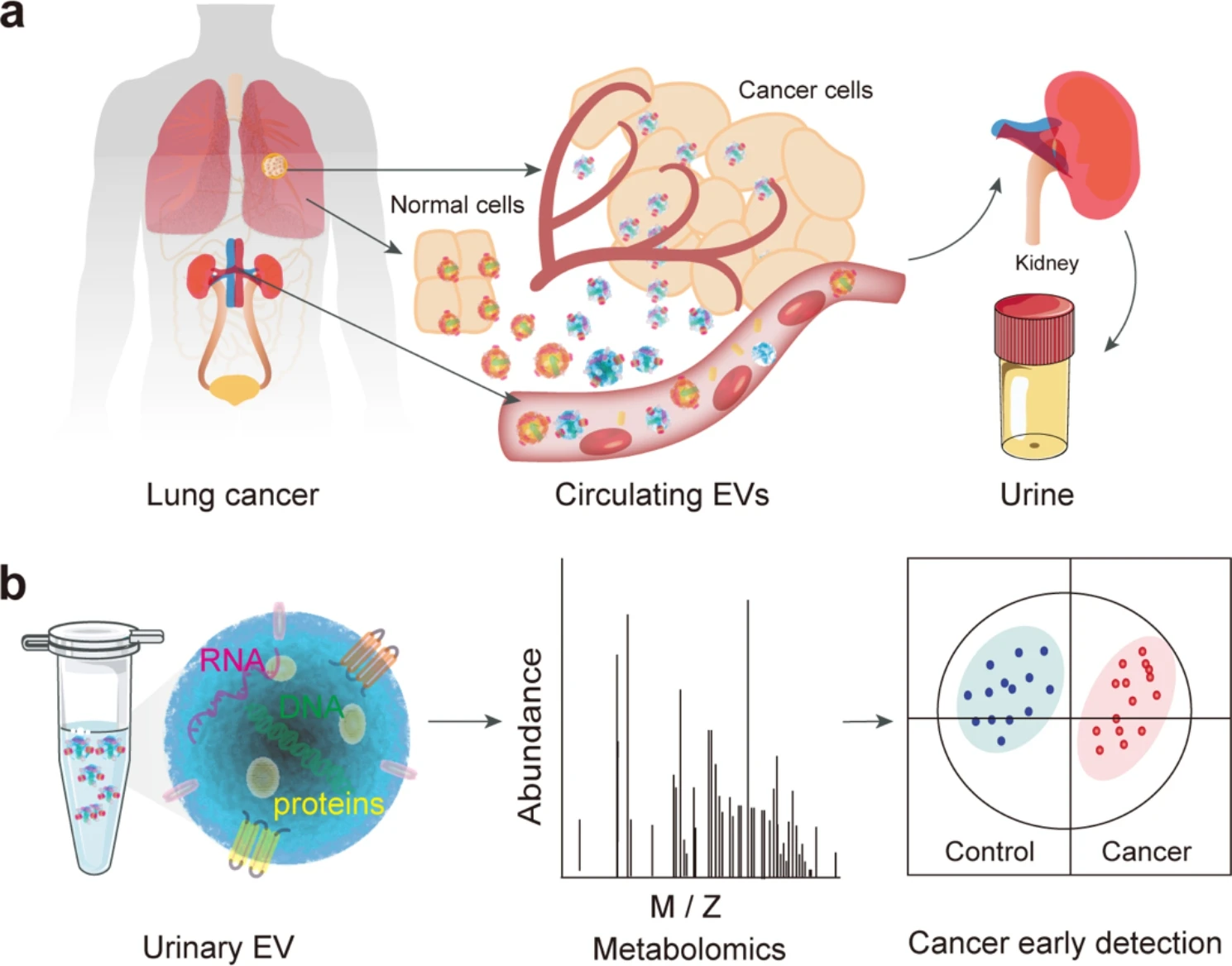Extracellular Vesicles Metabolomics Service
Extracellular vesicles metabolomics analysis is a high-throughput technology that focuses on analyzing metabolites in extracellular vesicles (EVs). Extracellular vesicles are nanoscale vesicles secreted by cells that carry intracellular metabolites, proteins, RNA and other molecules and participate in intercellular information transfer. Through high-resolution mass spectrometry, nuclear magnetic resonance (NMR) and other technologies, this service can comprehensively analyze the types, concentrations and changes of metabolites in extracellular vesicles, revealing their role in cell function, disease mechanisms and treatment responses.
Extracellular vesicles metabolomics service is widely used in cancer research, metabolic diseases, immune diseases, neurodegenerative diseases and other fields. Through in-depth analysis of metabolites in extracellular vesicles, researchers can discover disease-related biomarkers, explore the potential mechanisms of metabolic disorders, and provide data support for the optimization of clinical diagnosis and treatment strategies. In addition, this service is also applicable to precision medical technologies such as liquid biopsy, providing strong support for early diagnosis and personalized treatment of diseases.

Dudzik, D. et al. TrAC Trends in Analytical Chemistry, 2021.
Figure 1. Untargeted Metabolomics Analysis of EVs.
Services at MtoZ Biolabs
Based on high-resolution mass spectrometry platforms, nuclear magnetic resonance (NMR) and other advanced technologies, the extracellular vesicles metabolomics service provided by MtoZ Biolabs can conduct a comprehensive analysis of extracellular vesicle metabolites. This service includes extracting extracellular vesicles from samples such as blood, urine, and cell culture supernatant, and using these highly sensitive analytical platforms to qualitatively and quantitatively detect metabolites in the vesicles. Through precise metabolite detection and functional annotation, we ensure that the types, abundance, and disease-related metabolic pathway information of metabolites are obtained, helping researchers to gain a deep understanding of the potential role of extracellular vesicles in biological processes, disease mechanisms, and therapeutic responses. This service mainly covers the following two aspects:
1. Targeted Metabolomics Service
Targeted metabolomics service focuses on known specific metabolites. Researchers select and predefine the list of metabolites to be analyzed based on the research objectives. Using high-resolution mass spectrometry platform, we can accurately measure the concentration and abundance changes of target metabolites in extracellular vesicles, revealing the role of these metabolites in diseases. This service is suitable for studying specific metabolic pathways, disease marker discovery, and drug effect evaluation.
2. Non-Targeted Metabolomics Service
Non-targeted metabolomics service does not preset target metabolites, but aims to comprehensively scan all known and unknown metabolites in extracellular vesicles. Through advanced analysis platforms such as high-resolution mass spectrometry, it is possible to identify multiple metabolites in exosomes and provide a global metabolic profile to reveal potential biomarkers and changes in metabolic networks. This service is suitable for discovering new metabolic pathways, exploring unknown disease mechanisms, and performing a panoramic analysis of metabolites.
Analysis Workflow
1. Sample Collection and Extracellular Vesicle Isolation
Extracellular vesicles are extracted from samples such as blood, urine, and cell culture supernatant to ensure high purity and integrity. Extracellular vesicles are isolated using ultracentrifugation, density gradient centrifugation and other techniques.
2. Metabolite Analysis and Quantification
Advanced technologies such as high-resolution mass spectrometry and nuclear magnetic resonance (NMR) are used to comprehensively analyze metabolites in extracellular vesicles, including qualitative identification and quantitative determination, to reveal the types, abundance and changes of metabolites.
3. Data Processing and Bioinformatics Analysis
Use professional bioinformatics tools to process data, perform functional annotation and pathway enrichment analysis to reveal the dynamic changes and potential mechanisms of metabolites under different biological states.
4. Report and Result Interpretation
Provide detailed analysis reports, including metabolite identification information, abundance changes, related biological pathway analysis, etc., to help researchers deeply understand the role of extracellular vesicle metabolites in disease mechanisms, therapeutic targets, etc.

Williams, C. et al. Metabolites, 2019.
Figure 2. Key Stages of the Metabolomic Analysis Workflow for Extracellular Vesicle (EV) Samples.
Service Advantages
1. High Sensitivity and High Resolution
MtoZ Biolabs relies on advanced mass spectrometry platforms to accurately detect low-abundance metabolites in extracellular vesicles, ensuring high accuracy and sensitivity of data.
2. Comprehensive Metabolite Analysis
Provides targeted and non-targeted metabolomics services, which can comprehensively analyze known and unknown metabolites in vesicles, revealing potential biomarkers and global metabolic changes.
3. Diverse Sample Adaptation
It can support various types of biological fluid samples, such as blood, urine, cell culture supernatant, etc., to meet different research and application needs.
4. Customized Analysis Solutions
MtoZ Biolabs can provide personalized analysis services based on the customer's research goals and needs to ensure the most valuable metabolite data for specific research directions.
Applications
1. Cancer Research and Biomarker Discovery
By analyzing metabolites in extracellular vesicles, we can reveal the mechanisms of tumor occurrence, metastasis, and immune escape, help screen tumor-related metabolic markers, and provide data support for early diagnosis and treatment.
2. Metabolic Diseases
Extracellular vesicles metabolomics service can be used to detect changes in metabolites in extracellular vesicles, thereby revealing the potential regulatory mechanisms of metabolic diseases such as diabetes, obesity, and cardiovascular disease, and providing new biomarkers and therapeutic targets.
3. Immune Monitoring and Immune Regulation
By analyzing metabolites in extracellular vesicles, studying immune system responses, exploring their role in immune escape, autoimmune diseases, and other processes, we can promote the development of treatment strategies for immune-related diseases.
4. Drug Development and Efficacy Evaluation
Extracellular vesicles metabolomics service can be used to evaluate the metabolic effects of drugs, help optimize drug delivery systems, monitor drug therapeutic effects, and promote new drug development.
Case Study
1. Metabolomic Investigation of Urinary Extracellular Vesicles for Early Detection and Screening of Lung Cancer
This study aims to explore the metabolomics characteristics of extracellular vesicles (EVs) in urine as a potential method for early detection and screening of lung cancer. The subjects were lung cancer patients and healthy controls, and high-resolution mass spectrometry was used to perform metabolite analysis on extracellular vesicles isolated from urine. The results showed that there were significant differences in the metabolites of extracellular vesicles in the urine of lung cancer patients and healthy controls, especially in lipid metabolism, amino acid metabolism, and sugar metabolism. These differential metabolites may be related to the occurrence and development of lung cancer. By screening these metabolites, the study successfully identified a series of potential biomarkers that can effectively distinguish lung cancer patients from healthy individuals. The study concluded that metabolites in urinary extracellular vesicles have important diagnostic value, can provide new biomarkers for the early detection of lung cancer, and are expected to be used in clinical screening.

Yang, Q S. et al. Journal of Nanobiotechnology, 2023.
Figure 3. Illustration of Workflow.
FAQ
Q1: How to Ensure the Accuracy and Reliability of Metabolomics Analysis Results?
A1: We use advanced platforms such as high-resolution mass spectrometry (LC-MS/MS) and nuclear magnetic resonance (NMR) for metabolite analysis, and use strict quality control processes to ensure the accuracy and reliability of the data. In addition, we also use bioinformatics tools for data analysis to ensure the reproducibility of the results.
Q2: How to Deal with Sample Quality Problems that May Be Encountered during the Experiment?
A2: Our experimental design and sample processing procedures are strictly optimized to ensure that sample loss and degradation are minimized. If there are quality problems with the sample, we will communicate with the customer in a timely manner and provide professional advice to ensure the reliability of the analysis results.
How to order?







